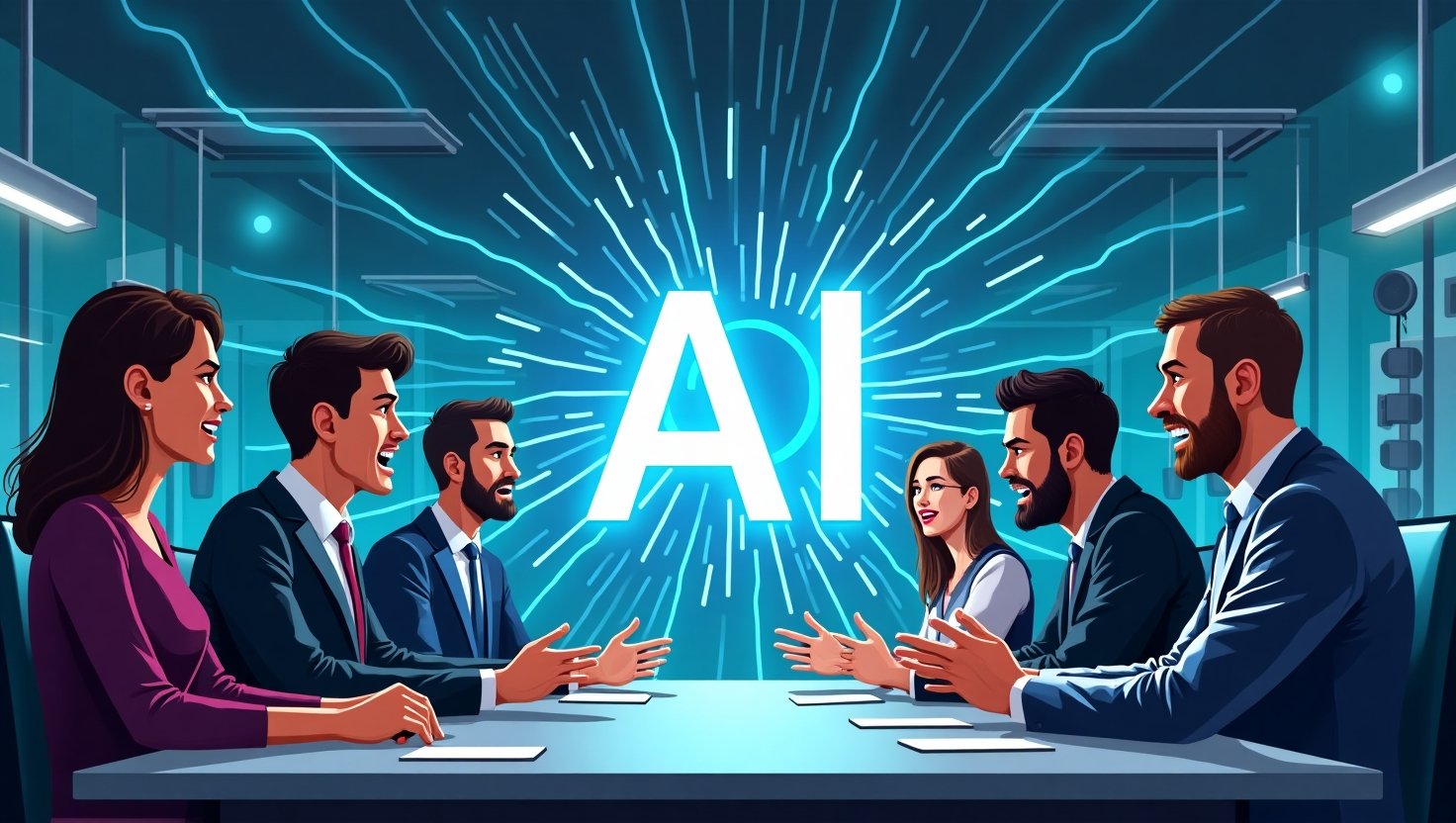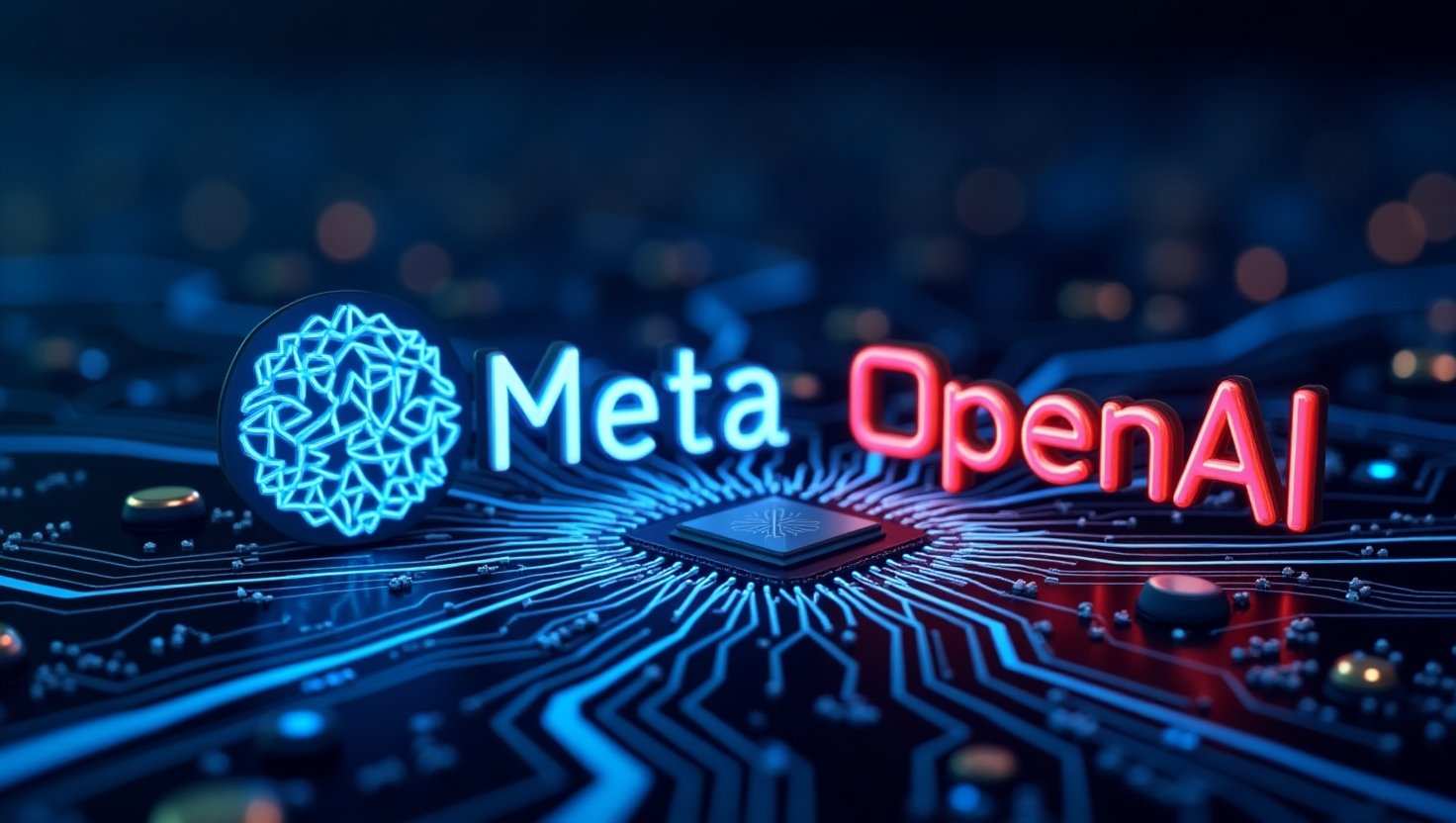As the race for artificial intelligence talent heats up, companies are fiercely competing in the so-called AI talent wars. With recruitment offers skyrocketing to over $300 million for top-notch AI researchers, the stakes have never been higher.
The demand for skilled professionals in AI is surging, with recent statistics showing that salaries for elite AI engineers can exceed $10 million annually. Furthermore, the rise of AI talent poaching has forced organizations like OpenAI and Meta to reconsider their hiring strategies, focusing not just on financial compensation but also on non-monetary benefits that enhance employee satisfaction.
Amid this fierce competition, technologies such as ChatGPT are reshaping the landscape by driving innovation and influencing recruitment practices. This article delves into the implications of these trends, exploring how they impact the future of AI development and the industry as a whole.

Meta’s Aggressive Recruitment Strategies for AI Talent
Meta Platforms Inc. has recently intensified its efforts to recruit top-tier AI researchers, implementing aggressive strategies that include substantial compensation packages and direct involvement from CEO Mark Zuckerberg.
High Compensation Offers
Reports indicate that Meta has extended offers with total compensation packages reaching up to $100 million over four years for senior AI roles. These packages are structured with stock grants tied to tenure and performance, rather than as lump-sum signing bonuses. For instance, during a company-wide meeting, CTO Andrew Bosworth clarified that while some senior roles may command compensation near that level, the actual terms involve various components, not just a sign-on bonus. TechCrunch
In one notable case, Meta reportedly offered a $1.25 billion contract over four years—approximately $312 million annually—to a potential AI hire, who ultimately declined the offer. Tom’s Hardware
Direct Recruitment Efforts
Mark Zuckerberg has personally reached out to AI researchers, including those from Google’s DeepMind, emphasizing the critical role of AI at Meta and expressing his desire for collaboration. This direct involvement underscores the company’s commitment to securing top talent. The Information
Strategic Investments and Leadership Appointments
Meta has invested $14.3 billion for a 49% stake in Scale AI, a data-labeling startup. As part of this deal, Scale AI’s co-founder, Alexandr Wang, joined Meta and is expected to lead research on superintelligence. TechCrunch
Industry Reactions and Challenges
OpenAI CEO Sam Altman has criticized Meta’s aggressive recruitment tactics, describing them as “somewhat distasteful” and expressing concerns about potential cultural issues. Despite Meta’s substantial offers, Altman noted that none of OpenAI’s top employees have accepted these offers. Financial Times
Additionally, some AI researchers have declined Meta’s lucrative offers, opting instead to join other organizations or startups. For example, an AI researcher reportedly turned down an $18 million offer from Meta to join Thinking Machines Lab, founded by Mira Murati. TechCrunch
These developments highlight the intensifying competition for AI talent and the challenges Meta faces in attracting and retaining top researchers, despite offering substantial financial incentives.
| Company | Base Salary Range | Total Compensation Range | Bonuses and Equity | Additional Benefits |
|---|---|---|---|---|
| Meta | $160,000 – $229,000 | $248,000 – $392,000 | Up to $300 million over four years | Health insurance, retirement plans, wellness programs |
| OpenAI | $300,000 | $700,000 – over $1 million | $500,000 to $2 million in PPUs | Unique equity structure, performance-based compensation |
The Impact of ChatGPT and AI Technologies on Hiring Strategies
As organizations navigate the competitive landscape of AI recruitment, tools like ChatGPT are increasingly influencing hiring strategies across various industries. The rise of AI technologies, including AI chatbots, has transformed not only how companies interact with potential candidates but also how they assess and select talent.
AI Chatbots in Recruitment
Implementing AI chatbots like ChatGPT streamlines the recruitment process by automating initial candidate screenings and enhancing communication efficiency. These intelligent tools can handle a vast number of inquiries simultaneously, providing instant responses to candidates about job roles, application timelines, and company culture. This level of engagement can significantly improve the candidate experience, making companies more appealing to top talent.
Moreover, AI tools can analyze candidate responses and interactions in real-time, allowing recruiters to focus on high-potential candidates more effectively. By incorporating advanced natural language processing, ChatGPT can assess soft skills and compatibility through conversations, enriching the evaluation process. Such innovations not only optimize efficiency but also allow for a more nuanced understanding of candidates, bridging the gap between technical qualifications and cultural fit.
Data-Driven Decision Making
The integration of AI technologies in recruitment also empowers organizations to make data-driven decisions. By collecting data on candidate interactions with AI chatbots and analyzing trends, companies can refine their hiring strategies. For instance, if a specific type of candidate tends to disengage during early interactions, recruiters can adjust their outreach approaches to better engage such talent.
Additionally, data insights from using tools like ChatGPT can inform the development of job descriptions that resonate with potential applicants, further enhancing the appeal of roles. By understanding which aspects attract candidates, organizations can tailor their messaging for better engagement.
The Future of Recruitment
As AI technologies continue to evolve, the influence of tools like ChatGPT on hiring strategies is expected to grow. The transition toward AI-enhanced recruitment processes signals a shift away from traditional hiring methods, emphasizing speed, efficiency, and candidate experience. Companies that embrace these innovations stand to gain a competitive edge in the quest for top-tier AI talent, ultimately shaping the future of recruitment in the industry.

Sustainability of Recruitment Efforts in the AI Landscape
The intense competition for AI talent has not only reshaped recruitment practices but has also raised questions about the sustainability of these efforts. As major players like OpenAI and Meta engage in aggressive recruitment tactics, often dubbed AI talent poaching, the implications on innovation and long-term sector health become profound.
Implications of Competitive Recruitment Tactics
The fierce battle for top-tier talent can lead to immediate short-term gains in capability and technological advancements. However, companies that rely heavily on poaching can inadvertently stifle innovation across the industry. When researchers constantly shift between firms, often lured by attractive compensation packages, the knowledge and expertise within organizations can become fragmented. This not only hampers company culture but also poses risks to the continuity of projects and research initiatives.
Furthermore, the relentless pursuit of talent can encourage an atmosphere of instability, where companies prioritize quick fixes over nurturing their existing workforce. This practice may hinder the development of robust internal teams capable of long-term strategic innovation. Potentially, it could lead to a devaluation of home-grown talent and deter businesses from investing in the development of their researchers.
Long-Term Sustainability Challenges
The ongoing trend of AI talent poaching brings about several sustainability concerns. For one, the resources allocated to recruiting and compensating high-profile researchers could detract from investments in other critical areas, such as research infrastructure or employee training programs. This misallocation may leave firms vulnerable to future technological shifts when they must adapt but have not invested adequately in foundational capabilities.
Moreover, a constant focus on high-salary offers can skew market perceptions of the value of AI roles, making it difficult for startups and smaller companies to compete. As the salary expectations for AI talent rise, this could result in a talent concentration in only a few major firms, stifling diversity and creativity in the space. Innovation thrives on varied perspectives; monopolizing talent diminishes opportunities for fresh ideas that smaller companies may contribute.
A Path Forward
To address these sustainability issues, organizations must shift their focus from merely acquiring talent to fostering a culture of growth and development. Implementing comprehensive employee development programs, providing meaningful work experiences, and promoting a collaborative environment can yield a more resilient workforce without chasing after talent through offers alone. These practices can encourage researchers to stay longer with their organization, ultimately driving innovation from within.
In conclusion, while the competitive recruitment of AI talent can offer immediate advantages, companies must consider the longer-term implications of these tactics on the innovation landscape and the overall health of the AI sector. Cultivating a sustainable approach to talent management will be crucial as the industry evolves.
Quotes from Industry Experts
To enhance the credibility and depth of this article, we have incorporated insightful quotes from notable industry figures, including Louise Matsakis, who provide perspective on the ongoing AI talent wars and recruitment strategies.
Louise Matsakis: “It’s so interesting… this is a field where the narrative matters a lot.”
This highlights the significant influence that narratives surrounding AI and talent can have on recruitment strategies.
On Internal Talent Development:
“Organizations also need to focus on retention: encouraging switching is pointless if talented individuals regret their decision after a few months or years. Supporting continuous development and recognizing success are all critical…”
On Sustainable Talent Strategies:
“To remain competitive, companies must fill gaps in AI hiring and understanding of AI usage policies.”
On Ethical Considerations in Recruitment:
“Organizations must navigate ethical considerations and prioritize ethical AI practices to build trust in their recruitment processes.”
On AI Integration Challenges:
“Only about 12% of HR professionals feel confident using AI tools… and many lack a basic understanding of these tools.”
– talnt.co
On Comprehensive Recruitment Approaches:
“To attract and retain AI talent, companies need to excel in acquiring skills rather than filling predefined roles.”
– bcg.com
These perspectives help to frame the conversation around the current landscape of AI recruitment and the strategic approaches companies may need to adopt for long-term success.
Conclusion
The ongoing AI talent wars highlight a critical juncture in the landscape of artificial intelligence recruitment. Companies like Meta and OpenAI are engaged in fierce competition, often offering staggering compensation packages that surpass $300 million to secure elite researchers. As explored throughout this article, such aggressive recruitment strategies raise fundamental questions about sustainability and the long-term health of the AI sector.
Key findings show that while financial incentives may provide short-term benefits, they can also lead to the fragmentation of knowledge and culture within organizations. It is imperative for stakeholders, including tech companies, HR leaders, and policy-makers, to reflect on the lasting impact of these practices.
The emergence of AI technologies, particularly tools like ChatGPT, offers both challenges and opportunities for recruitment strategies. Companies that leverage these innovations can enhance engagement, streamline processes, and make data-driven decisions that resonate with the evolving job market.
In conclusion, as we navigate through this competitive landscape, the lessons learned from the AI talent wars must inform our approach to recruitment moving forward. Embracing a balanced strategy that extends beyond compensation will ultimately drive innovation while fostering a diverse and dynamic workforce. As stakeholders in this field, we have a responsibility to reflect on the implications of our recruitment practices—promoting not only financial profits but also ethical standards and sustainability in the industry.
User Adoption Data for ChatGPT
ChatGPT has illustrated remarkable growth and integration across various sectors, which directly impacts the demand for AI skills in the recruitment landscape. Below is a summary of the key statistics and implications regarding user adoption.
User Growth and Demographics
- Massive User Base: As of April 2024, ChatGPT has surpassed 180.5 million monthly active users (MAU), showcasing a significant increase from 100 million in January 2023. With daily active users (DAU) hovering consistently above 100 million, this affirms the platform’s explosive popularity.
- Demographic Insights: The largest user segment is aged 25–34, accounting for approximately 30.58% of users. This is followed by 18–24-year-olds at 24.27%. Notably, adoption decreases among older demographics, with only 5.15% of users over 65.
- Gender Balance: User distribution shows a relatively balanced gender ratio, with 54.74% male users and 45.26% female users, indicating broad appeal across gender lines.
Business Integration and Industry Adoption
- Enterprise Engagement: ChatGPT sees significant adoption by enterprises, boasting 1.5 million customers across various sectors as of January 2025. Notably, 92% of Fortune 500 companies leverage ChatGPT for different applications, highlighting its integral role in corporate operations.
- Industry Usage Distribution: The technology sector leads in usage at 28%, trailed by education (23%), business services (11%), and manufacturing (10%). This distribution emphasizes AI’s versatility across fields.
- Professional Utilization: A survey revealed that 43% of professionals employ AI tools like ChatGPT for diverse tasks, although 68% opt not to disclose this to their supervisors, suggesting a growing yet discreet reliance on AI in professional settings.
Implications for AI Recruitment and Demand for AI Skills
- AI in Hiring Processes: About 50% of job applicants utilize AI tools such as ChatGPT when crafting resumes and cover letters. This influx of AI-generated applications poses challenges for recruiters who must differentiate candidates in a new landscape.
- Increased Demand for AI Competencies: The integration of ChatGPT into business practices amplifies the demand for AI skills, pushing industries to seek professionals well-versed in AI technologies to manage and optimize these tools effectively.
Conclusion
The staggering growth in ChatGPT usage reflects not only its profound impact on personal user engagement but also hints at a transformational shift in the business recruitment landscape. As organizations continue to adopt AI tools, the urgency for skilled professionals in AI and related fields will inevitably rise, shaping the future of work in an increasingly tech-driven economy.

